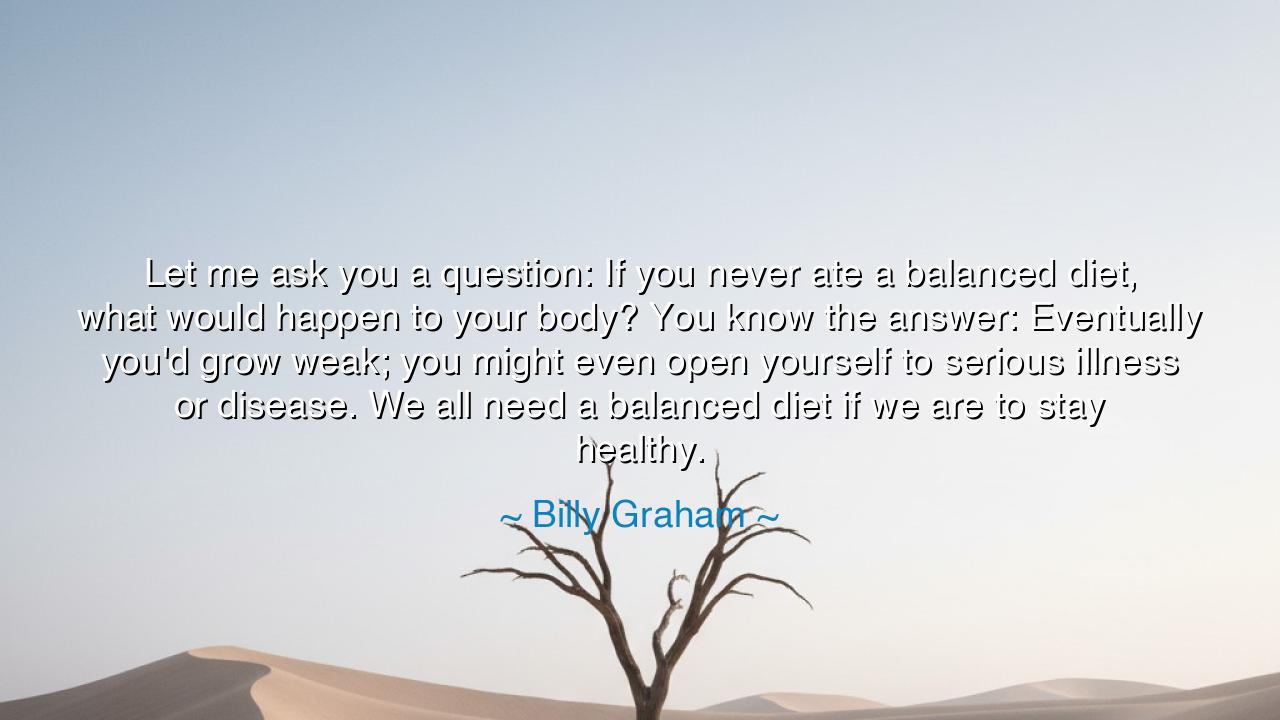
Let me ask you a question: If you never ate a balanced diet, what
Let me ask you a question: If you never ate a balanced diet, what would happen to your body? You know the answer: Eventually you'd grow weak; you might even open yourself to serious illness or disease. We all need a balanced diet if we are to stay healthy.






In the vast symphony of life, where each of us plays our part, there is one truth that governs our ability to thrive: the need for a balanced diet. Billy Graham, in his profound words, poses a simple yet powerful question: "If you never ate a balanced diet, what would happen to your body? You know the answer: Eventually you'd grow weak; you might even open yourself to serious illness or disease. We all need a balanced diet if we are to stay healthy." This question, though seemingly about the physical body, holds a far deeper truth—that the balance of our nourishment is essential not only for our bodies but for our very lives.
The ancient wisdom of the Greeks reminds us that health is a reflection of harmony. Hippocrates, the father of medicine, taught that "Let food be thy medicine and medicine be thy food." Yet, this was not a simple prescription for eating; it was a philosophy about the balance between the body and the world it inhabits. The ancient Greeks understood that the body, like the mind and the soul, requires balance to function at its highest potential. Just as an artist must balance light and shadow on the canvas, so too must we balance the foods that we consume to create harmony within ourselves. Without such balance, the body falters, and illness creeps in, as Graham so wisely observes.
Consider the story of Leonidas, the mighty King of Sparta, who led his soldiers to greatness at the Battle of Thermopylae. The Spartans, known for their discipline and strength, were not just warriors; they were a testament to the importance of balance in both mind and body. Their training was rigorous, their diet strict, and their physical prowess unparalleled. Yet, their ability to fight with such courage and resilience was not born of excess or indulgence, but of balance—a balance between the strength of the body, the focus of the mind, and the spirit of the warrior. Had the Spartans neglected the nourishment of their bodies, had they lived without regard for balance, their strength would have diminished, and they would have fallen to the forces that threatened their world.
In a similar vein, the ancient Romans, who valued both physical and mental strength, knew that the key to well-being was not found in extremes, but in balance. Cicero, one of Rome’s greatest orators and philosophers, often spoke of the importance of moderation. He understood that a life lived in excess—whether in food, drink, or ambition—leads to imbalance, and that imbalance brings forth weakness, both physical and mental. To be truly healthy and strong, one must learn to walk the middle path, to nourish the body with what it needs, not more and not less. Graham’s reflection on balance resonates with the wisdom of these ancient philosophers: that the body, like the soul, requires balance in all things to remain strong and vibrant.
The truth that Graham speaks of extends beyond just the body. The balanced diet he refers to is a metaphor for the balance we must find in all areas of our lives. Diet is not merely a matter of food; it is a matter of balance in how we feed our spirits, how we nourish our minds, and how we find harmony in our daily pursuits. Just as we cannot expect the body to thrive without proper nourishment, so too must we tend to the soul with wisdom, kindness, and purpose. To live without this balance, to neglect our inner needs as we sometimes neglect our physical bodies, is to invite disease—disease of the body, the heart, and the mind.
Consider, too, the great warrior Gandhi, whose spiritual and physical strength came not from excess, but from balance. In his simple lifestyle, Gandhi found that true health comes from the nourishment of both the body and the soul. He practiced moderation, not only in food but in all aspects of his life. His ability to stand against the tides of oppression, to lead with integrity and peace, was rooted in his balance—a balance that allowed him to remain strong in the face of adversity, to live his principles in action, and to inspire millions.
And so, Billy Graham's wisdom invites us to reflect on the balance that we must cultivate in our own lives. It is a call to nourish ourselves, not with extremes, but with what the body, mind, and spirit truly need. Diet, in its most profound sense, is not about limitation, but about understanding and wisdom. It is about listening to the body and feeding it with care, while also nourishing the soul with the things that bring it peace, joy, and purpose. To live without this balance is to open the door to weakness—in body, mind, and spirit. But to live in balance, to nourish ourselves fully and wisely, is to thrive.
As you walk your own path, take this lesson with you. Seek balance in your daily life. Nourish your body with the foods that strengthen it, but also nourish your spirit with the things that bring you joy, peace, and clarity. Let your actions be grounded in wisdom, and let your heart be filled with understanding. For it is in balance that we find true health, and in true health, we find the strength to face life’s challenges with grace and resilience. Let the wisdom of the ancients guide you, and remember that just as the body needs a balanced diet to remain strong, so too does the soul.






AAdministratorAdministrator
Welcome, honored guests. Please leave a comment, we will respond soon